Every child is different, and those differences make life a beautiful kaleidoscope. Our family was formed through adoption and through our most recent adoptions we have become familiar with various aspects of developmental delays.
We adopted our sons domestically, and then we adopted our two two year old daughters from China one year apart. With each adoption our lives have changed. Our days have become more intentional, our calendars more detailed, and our home a lot louder. Some days are smooth, and others we spin in a lot of directions as we work to meet everyone’s needs.
It’s both exhausting and incredibly gratifying. We lean on God a lot more than we used to, and He is gracious. We are a family of six now when we at one point didn’t know if we would ever have children; and we are so blessed to be a family who can share a little about our journey of adopting children with developmental delays.
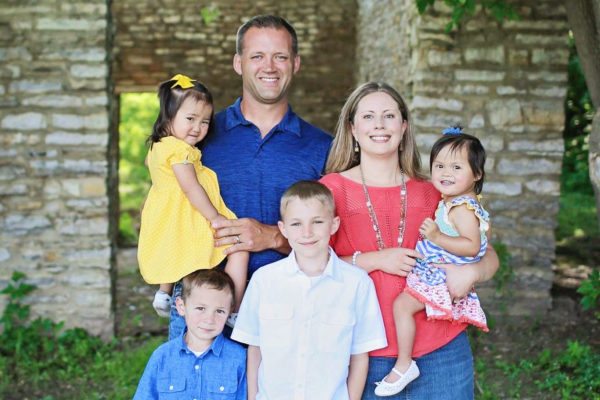
Two of our children were at one point or another diagnosed with developmental delays, but honestly all of our children have developed various skills at different times. We are parents, but we are both also teachers, and we see this every single day in our students as well. Kids develop according to their own timelines, and most kids develop certain things earlier and certain things later. Children develop when they are ready.
When we began the process to adopt from China, like every family, we spent hours educating ourselves on the various medical and developmental terms that make up a medical conditions checklist (MCC). Since China is a special needs adoption program, we knew that we were going to adopt a child who needed medical care.
One part of this checklist that our social worker told us everyone usually checks is being open to developmental delays. Our social worker explained that for kids who have spent their early years in an orphanage environment, every three months of institutional care equals one month of delay. We understood this, but this specific guideline is not set in stone, and we’ve seen through two adoptions that kids are unique.
Developmental delay often is a medical need that adoptive parents say yes to without fully understanding. Not all kids will catch up in the same ways.
Some kids will always have delays, and parents who include developmental delay on their medical needs checklist need to be okay with that.
The only promise with this special need is that a child will have a much better life with a family than in an orphanage if they do have significant developmental delays, and that you will be amazed by how much he/she can learn. These kids, they will inspire you, and they will make you a better person.
We have always been open to adopting a child with developmental delays. The biggest change that occurred from our first China adoption to our second was that, after parenting our first adopted daughter, we were much better prepared to parent a second child with multiple medical needs.
While we expected our first daughter to have more minor needs, we were not positive until she got home what her medical and developmental challenges would be. We also naively believed that most kids with developmental delays would catch up, according to the statistics we had become familiar with.
Some people watch videos of the child they hope to adopt and attempt to make guesses at the future. Some people watch videos and look for the spark in a child’s eyes that they believe means they will catch up. I remember watching a video of our daughter prior to being matched with her, and I remember noticing that she had zero core strength. She looked like she could fold in half. But she somehow still seemed strong.
Because of her medical needs, likely due to environmental factors, she was lacking muscle tone. There is no way to predict whether low tone and delays are due to lack of use or lack of ability. Our lively and very spunky daughter looked depressed and shut down in most of the pictures we received. Images and videos sent from 7,168 miles away couldn’t show her true personality at all. Almost everything we assumed about her was wrong.
Some kids do catch up very quickly once they are adopted. Over the past year, our first adopted daughter went from being a 14 month old who couldn’t bear weight when standing to a child who runs, plays, climbs, and is incredibly strong. When we met her in China, she was weak, and we wondered if she had more significant issues with her legs. She cried for a few hours on and off the first day, but then she quickly clung to us. She was and still is a very smiley little girl.
I’ll never forget the excitement in our youngest son’s voice when he saw her take her first steps after practicing so much. He was so happy and so proud of her. He had been encouraging her to take steps, and being a part of that process was so important to him. She’s two now, and last night she taught herself how to pump her legs on a swing and was also trying to do cartwheels! She has come so far so fast!
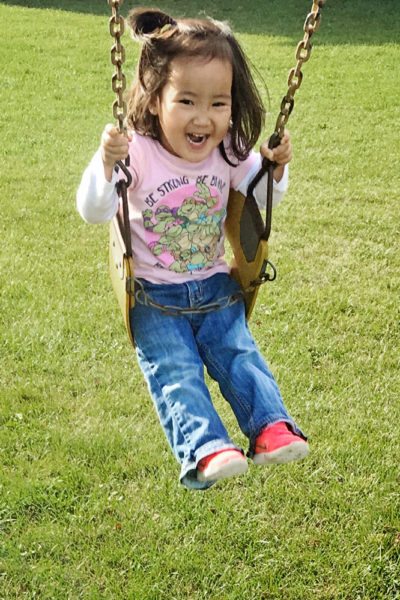
Initially after coming home, she was receiving services from our county birth to three program, but she is no longer getting active services. She can sing, dance, count, recite nursery rhymes, color, and keep up with every other two year old in the neighborhood.
She’s thriving, and it has been such a blessing to witness.
She does still have challenging orphanage related behaviors and she knows how to throw a tantrum, but some of the orphanage behaviors have slowly decreased as she’s become more comfortable with us. She is on the go at all times, she loves sensory activities, and she needs constant supervision. The Out-of-Sync Child book has been a great resource. It’s truly hard to know though what is typical two year old behavior and what is orphanage related at this point. She is healthy, and the progress she has made developmentally over the course of a year has been very smooth.
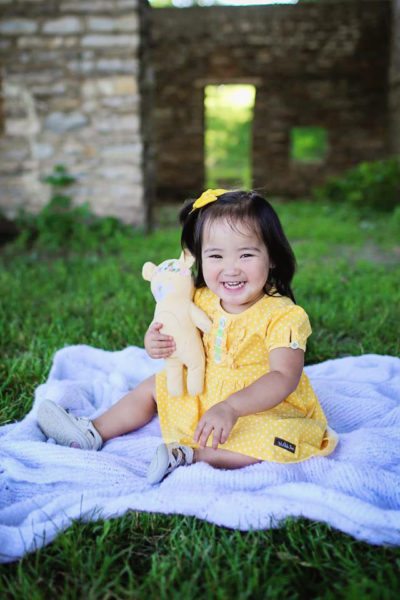
From 2015-2017 we met people and formed relationships that prepared us to adopt our second daughter, and we also learned more about real developmental delays. Adopting our second daughter, we knew she had a complex medical history. While we understood that her main medical need was complex cardiac, we believed that she had challenges beyond those mentioned in her medical file.
We watched her play and laugh in videos we received, but we could tell she didn’t have any idea how to crawl or stand. She played imaginatively with toys, and complained when others took her toys. She was sweet and gentle, and there was something, just a small hint of something, that made us wonder if she had hearing problems. It might have been the tilt of her head. We can’t explain it in any logical way – and it wasn’t in her file – but we felt it.
Developmental delay can vary greatly, and it is impossible to know in advance how a child will catch up, or even if they will. Our second daughter’s health history is like an intricately woven novel with every other page missing.
What we did get was quite detailed. Her file contained more information than most people get, and we felt like we were relatively prepared. We raced to get her home quickly once we were matched. Her file mentioned gross motor delays, and we knew that other children her age in her orphanage were walking while she was not yet even crawling.
Her heart condition seemed stable, but she was struggling to grow. We didn’t know if her delays were related to environment, malnutrition, shifting caregivers multiple times, time spent in hospitals, or potentially even due to low oxygen levels prior to or after her first heart surgery. We could not bring her home fast enough.
Significant delays are fairly common for kids with congenital heart disease. We tried to be so prepared, so educated, and still, we were not ready for our first day with our newest daughter. She was so sick, so brokenhearted, and we knew the moment we first held her that she had missed a lot of developmental milestones.
Parenting a child with multiple medical needs is a blessing in so many ways, but our most recent time in China was one of the hardest times we’ve experienced as a family. We messaged with our support network of China adoption moms daily, and they talked us through many minor crises.
We had envisioned our first days with our daughter going much differently. She was in shock, she was terrified of us, and she was frozen and unwilling to trust us for weeks. Her fear was palpable, and her emotions intertwined with our own. She acted like her legs could not bend because she didn’t want to make it easy for us to hold her, she threw up repeatedly from fear and illness and she struggled to breathe through the night. She was feverish, and malnourished – her waist was so small; it was incomprehensible. I cry thinking about the first time I changed her diaper, and I always will.
In the first few days, we didn’t know if we would be enough for our precious new daughter, and we tried to think too far in advance. Those first few days, we allowed fear to overshadow God’s promises. We had raced to our daughter because we knew she was sick, and we felt absolutely helpless in the moment. We also suspected right away that she could not hear well.
The city we were in didn’t seem like a good place to seek medical care, so we just did our best. We just wanted to get our daughter home. It was a traumatic week for our little girl as she adjusted to life in our family, and we learned how to take care of her. She was so scared, and so brave.
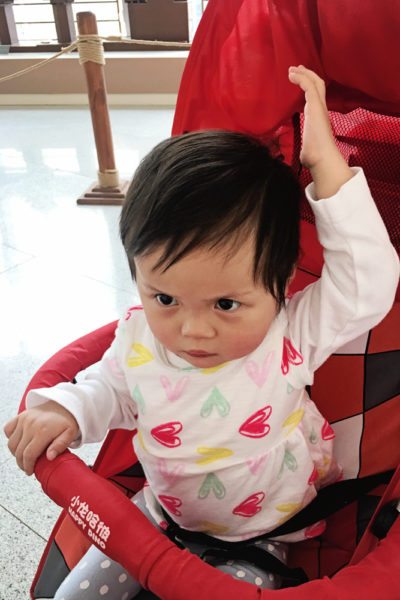
No one ever told us – as we struggled in China with all of our daughter’s unexpected medical and developmental needs – that not in spite of, but because of these challenges, we as a family would learn to love even more fiercely and protectively than we knew was possible.
No one ever told us that through this journey God would mold us all according to His will.
No one ever told us He’d hold our hands and walk this journey with us and that we were not the only deciding factor in our child’s growth.
No one ever told us that the farther we had to climb, the more exquisite the view would be.
Some kids take their time to gain skills once they are in a family, and not every kid will catch up. Because both our girls are the same age, it is difficult not to compare even when we know that we shouldn’t. Our second daughter was adopted at 24 months old, and her early years involved more changes in caregivers, congenital heart disease, and a surgery with complications before the age of one.
We are so in awe of her resilience.
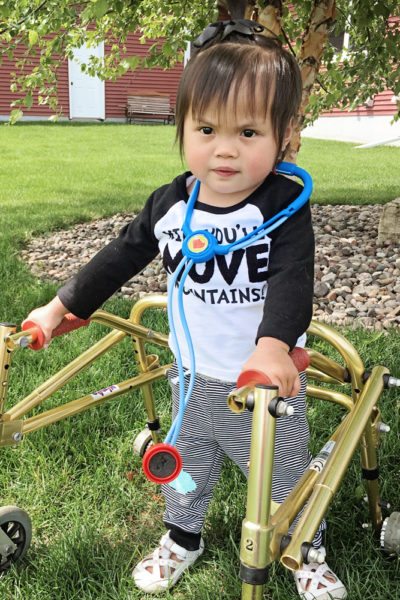
In the early days as her parents, we spent time contemplating the “what ifs” in relation to developmental delays. We quickly realized that if our daughter never learned to walk, we would love her just the same, maybe even more fiercely, while we sought out the resources needed to enrich her life. We realized within a few weeks that if she needed to communicate with sign language, we would learn it. We were committed to gaining her access to everything she would need, and we would all gain new skills and experiences because of it.
Sometimes the things you think are meaningful pale in comparison when you’re confronted with much bigger issues. Parenting a child who is labeled developmentally delayed is a little bit different, but mostly it’s the same.
Growth occurs when it’s meant to and we are having so much fun playing with our children along the way. Therapy for little kids is really just very intentional play.
Our newest daughter’s growth since coming home has been slow and steady. At one point this summer her medical diagnosis list was very long. Treating her severe reflux (GERD), getting ear tubes, and surgically repairing some problems with her heart have given her back the ability to grow and learn. She has been through a lot since coming home five months ago.
She is currently in physical therapy and the county early intervention program. We have researched developmental toys, and purchased items that helped her gain core strength. We have also talked to other parents who had children working on core strengthening activities. Our sweet girl is gaining skills so quickly now, and her list of diagnoses is shortening. She is still developmentally delayed, but those terms don’t significantly impact daily life.
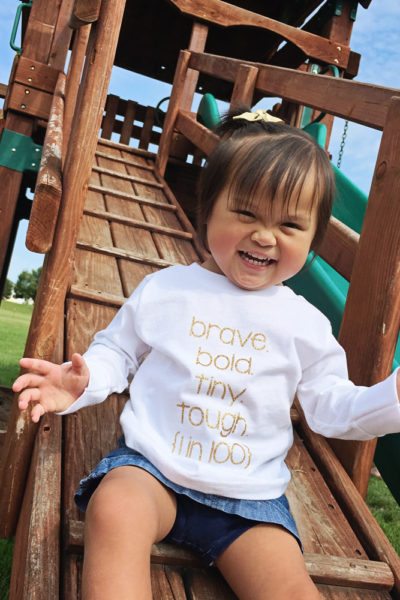
When we began writing this article she could stand, crawl, and take a few steps. Last week, she started walking! Our next step is teaching her how to stand up without having to pull up using furniture.
She is gaining speech at her own pace, and she loves baby sign language. Truly though, none of these skills changes who she is or what brings us the most happiness. She is special, she is courageous, and she is one of the happiest children I have ever known. She smiles, she laughs, she makes all of our lives so much fun, and she communicates very easily with us. We realized in China that she learns sign language easily, so we’ve been watching Baby Sign videos as a family to help bridge the language gap as she learns. It is so much fun for all of us, and our other children are also learning sign language because of this.
So what is life like parenting a child with developmental delays?
Saying yes to adopting a child with developmental delays means saying yes unconditionally…
It means saying yes to parenting differently.
It means saying yes to various forms of therapy and being open to seeking early childhood intervention.
It means yes to calling moms across the country to talk about parenting kids who are similar to yours.
It means yes to seeking out answers.
And it means saying yes to experiencing the beautiful highs and lows alongside your child.
We have found support in unlikely places, learned how to lean on others and ask for help when we need it and learned how to let go of activities that are not truly important to make room for what is important. We’ve learned how to pray and have complete faith in God’s promises. Some days it feels like learning to ride a bike for the first time; you keep going because if you slow down, you just might lose your balance.
Some of the hardest moments have been pushing our newly adopted daughter to work on skills she needed to gain but didn’t want to. And even though I’ll never forget how hard it was for her to learn to stand, the joy and victory of watching her learn to walk brightly outshines the hard parts.
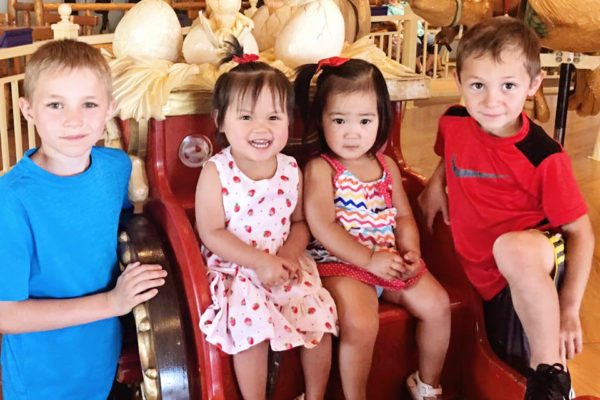
We are Christian parents. It is our goal to provide all of our children with what they need to learn and grow in faith. We value our children’s strengths, and work to help them succeed in the areas they are working to improve. Life isn’t a sprint, and there aren’t winners or losers. We all end up at the same place no matter how we start. Life is more of a winding road along which we have many chances to make a difference and share God’s message.
As a parent, it’s our job to help our children view life through that lens as well. As parents we believe that our children’s worth isn’t based on their own works or on their own developmental abilities. They aren’t worthy because they can run fast or catch a ball, and they definitely aren’t worthy because they can read well or speak clearly.
Our children are worthy because they have been set apart and redeemed. They are worthy because they are children of God. Jesus has made them shine, has made them blameless, and living with medical needs and developmental delays can’t touch that kind of perfection.
There is something extremely important about adopting a child with special needs of any sort. It’s related to mindset. You have to go into this process with the belief that you were chosen for this journey because you are able. You have to believe in your child 100% of the time, and you have to be patient. You have to have a mindset that looks for joy every day whether it’s in using a fork correctly or putting in a puzzle piece the right direction.
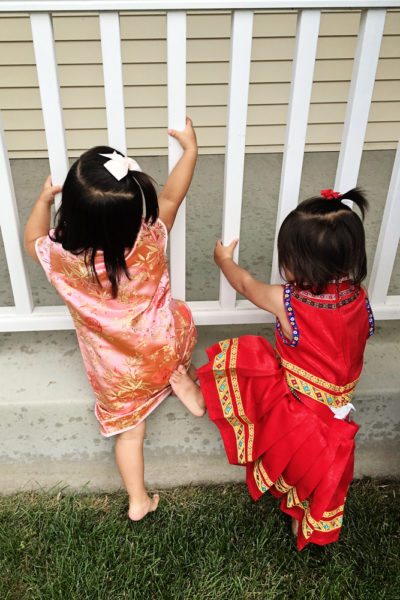
Children are unique, and what the future holds for any of our children is not promised. What we have is today, and the triumph that transcends daily difficulties.
God is always faithful, and seeing His hand in every step of the adoption process means knowing that in every moment, every hurdle, every mountain climbed, He will give us the strength we need and guide us along the way.
– guest post by Angie

























Leave a Reply